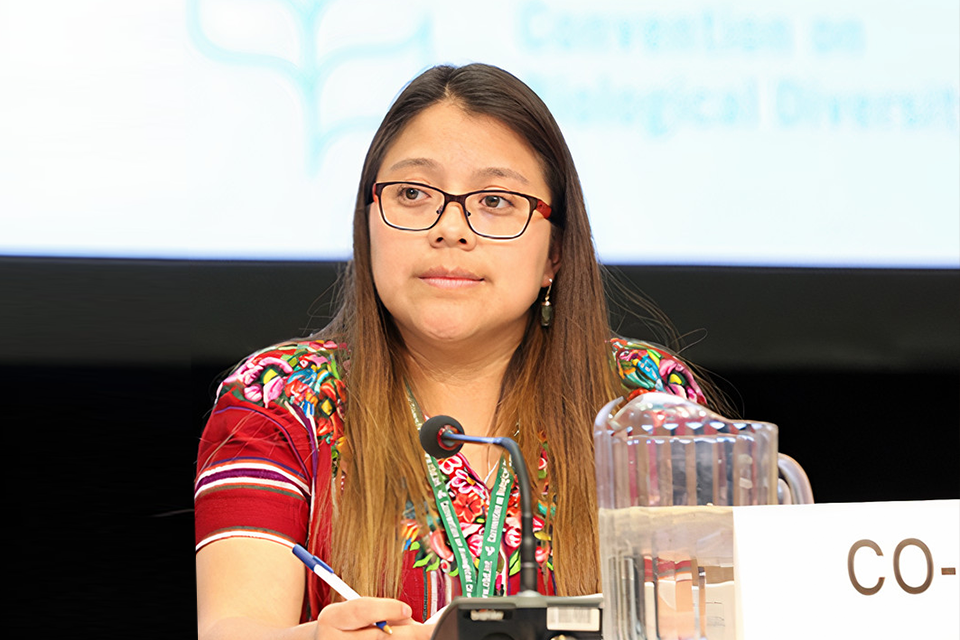Women in Leadership: Activists dedicated to environmental restoration and conservation. | Juliana Upun
Date:

Yeshing Juliana Upún Yos, is a 33-year-old Maya Kaqchikel woman from Patzún, Chimaltenango, Guatemala. She studied legal and social sciences. She has dedicated her career to the rights of indigenous peoples and women, carrying out actions aimed at defending the collective rights of indigenous peoples, especially on issues related to natural resources, sustainable development with a focus on biodiversity conservation, based on traditional knowledge. She is currently the coordinator of indigenous peoples' rights for the Sotz'il Association of Guatemala.
Why do you defend the environment?
The indigenous vision of natural resources is based on the idea that the land and nature are our "Mother Earth" and "Mother Nature", Loq'oläj Ruwach'ulej". Mother Earth is our home, the sun is our father, the moon is our grandmother, the air, the water, the trees, the animals are our brothers, the human being, Mother Earth and the universe are a whole that interact in balance and harmony.
Natural resources are sacred elements that allow life in a territorial, social, political, economic and cultural space, millenary source of wisdom, from the Utz K'aslemal that in Mayan language Kaqchikel, means "to live well" or "harmonic life in permanent construction", which implies a growth of the spiritual and material quality of life, which are in close connection and balance with mother nature and the universe, therefore, its care is fundamental. It is no coincidence that a great deal of biodiversity is found in indigenous territories that occupy 22% of the planet's surface.
For this reason, at Sotz'il we have been working on processes that recognize, respect and strengthen the systems of use, management and conservation of natural resources.
What is the relationship between feminism and the environment?
Indigenous women raise the issue of gender from the vision of the duality of woman and man. To talk about feminine energies is to talk about our mother earth, our mother nature. For the Mayan culture it is to talk about grandmother Ixkik, Ixmukane, grandmother Kawoq, one of the 20 days of the Mayan calendar dedicated to women. Within the Mayan culture, duality is the point of balance between feminine and masculine energies. For example, if we talk about the Creators of the Universe we find the two energies Qaja' Paluna' and B'alam kitze, Chomija' and B'alam Aq'ab', Tzununija' and Majukutaj, Kaqixaja' and Iq' B'alam.
Why do environmental issues particularly affect women?
Indigenous women are the ones who are closely interrelated with Mother Nature, we are the fundamental bastion of culture, but we are also being discriminated against three times as much, for being women for being indigenous and for being poor.
In this regard, we want to recognize and emphasize that indigenous women play a key role within our peoples in terms of the intergenerational transmission of our spiritual traditions, the history of our peoples, our philosophy and in the defense of the land, territory and natural resources and in the conservation of biodiversity.
How do you practice activism in both cases?
We are currently implementing participation strategies along three tracks, territorial, national and international, for which we are building technical-political proposals on the respect, recognition and practice of indigenous women's rights on issues of use, management and conservation of natural resources. We support processes of full and effective participation of women at different levels and implement territorial actions that allow women to be protagonists of their own development or ütz K'aslemal.
We are currently promoting a work agenda within Sotz'il from the approach of indigenous women, in the areas of Climate Change, Biodiversity, traditional knowledge and modern technology.
What is the connection between environmental preservation and women's land rights?
Indigenous women have developed for centuries, a knowledge to coexist and conserve the different ecosystems and environment, this knowledge is an integral part of our cultures, are part of our daily lives. We believe that if we strengthen our rights, we consolidate the conservation and protection of the environment because the cultural practices of indigenous women are the basis of our collective rights as peoples and as indigenous women.